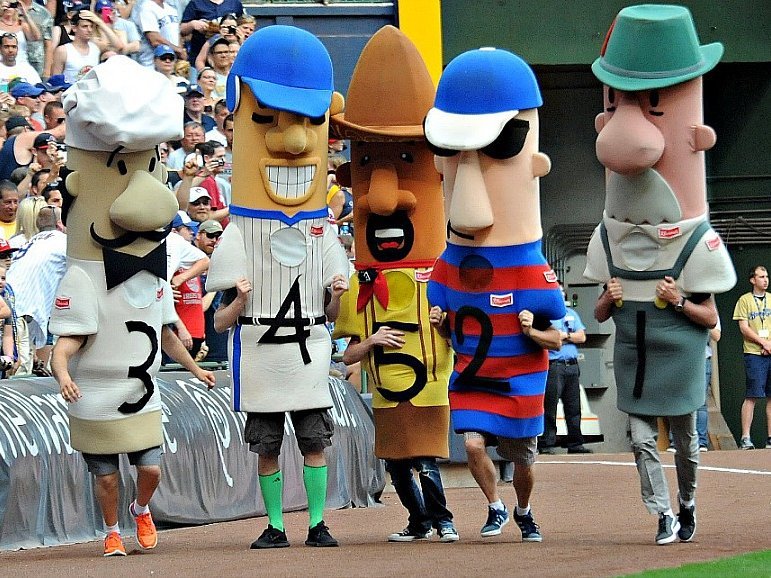Lyle Overbay can still remember it, watching his young teammate J.J. Hardy try to learn the art of hitting major league pitching on the fly.
He winces at the memory, actually.
Overbay was 28 in 2005, and he was coming off a breakout year in which he hit .301 and led the league in doubles with 53 for the Milwaukee Brewers. It was his first full season in the majors, and he had gotten out to a hot start with a .293 average through his first 22 games, setting him up for a seven-year stretch where he averaged 149 games played for the Brewers and Toronto Blue Jays.
Then there was Hardy, the 22-year-old shortstop who made the team out of spring training. Hardy didn’t crack the Mendoza Line (.200) until July 18 and finished the year hitting .247. A future All-Star, Hardy hit .194 with 25 strikeouts over his first 223 plate appearances (70 games).
Overbay pulled him aside to talk to him, as did former Brewers manager Ned Yost. Hardy was sure he was going to be sent back down to the minor leagues.
"They expect that (struggle), just go out and get better," Overbay recalled telling the youngster. "It will get easier. It will. But if you start to continue to doubt yourself, doubt your ability, you are going to go down and you’ll stay down.
"It’ll beat you up real quick."
Overbay saw the same thing unfolding this year with left fielder Khris Davis. After showing some promise at the plate late in 2013, Davis was thrust into the starting lineup and expected to contribute.
Instead, the 26-year-old hit .238 with a .267 on base percentage through March and April.
"I’ve always said one of the hardest things to do is to start the season in the big leagues as a hitter," Overbay said. "When you get called up in the middle the season and you’ve 200, 300 at-bats, you feel you know where your swing is and you’re usually pretty hot when you get called up anyway. They’re not going to call you up when you’re 0-for-20, they’re going to call you up when you’re hot. And it doesn’t really matter when you’re hot, you can do that."
Then, it got worse – Davis hit .218 in his first 17 games of May.
"Well now, you start doubting yourself," Overbay said the mindset.
Scooter Gennett gets it.
Only, Gennett struggled during his first call up in 2013, hitting just .217. He was much better prepared the second time around, finishing the season hitting .353. This year, his first on an Opening Day roster, he started hot (.290 through April 30), then slumped (.247 May 1-31) and then got hot again in June.
"When things aren’t going so good it gets frustrating," he said. "I think that’s where Lyle’s going with it – starting here and not getting off to the best start can be frustrating because you know it matters. Everybody sees it and everybody knows what’s going on if they want to. The good hitters come out of that and they find a way to get back to success."
Examples of that can be found throughout the Brewers clubhouse.
Jonathan Lucroy didn’t hit immediately after his call-up in 2010, hitting .254 in his first 16 starts. But, starting the year with the club in 2011 he hit .310 over the first two months.
Then, you have Carlos Gomez who hit .230 with 14 strikeouts in his first month of major league ball with the New York Mets in 2007 but only marginally improved (.270) in starting the year with the Minnesota Twins in 2008.
Shortstop Jean Segura only hit .205 in his first 22 games with the Brewers after his call-up in 2012, then finished the year on a tear (.329). He carried that over at the start of last year, his first on an Opening Day roster, hitting .354 over his first two months en route to an All-Star berth.
Part of it is adjusting to the quality of major league pitching, perhaps learning how to embrace and make mechanical tweaks, and even growing more comfortable in their own skin as major leaguers.
But, most of it is mental.
"I guess as a hitter down there (in the minors) you don’t feel maybe as much attention is on you," Gennett said. "I guess at times you don’t feel like you have to get a hit that at-bat and you go up there clear minded, you relax and hit. Here, when things aren’t going as good, you want to get a hit so bad, you want to help your team out because wins and losses really matter in the big leagues. So, for me, it’s just, I want to be at the top of my game to help the team."
The veteran hitters with the Brewers have been through it, so they are willing to offer help and advice – which again, is all about the player’s mental state than their physical one.
"We try to explain it’s 162 games," Gomez said. "If you get three base hits in 10 at-bats, you’re Hall of Fame. So, it’s more down than up but you have to come here positive and continue to work because you’re here for one reason – you’re good. You belong here. You just keep in the good work and realize yourself and be honest with yourself, what you can do to win games."
If anyone can speak to that, it’s the Brewers All-Star centerfielder. Blessed with physical gifts even the best players in the game are envious of, it took him seven seasons to put it all together.
So, he stresses that when it comes to hitting, it’s all about the mindset.
"You have to believe you’re good," Gomez said. "I heard this from players like Ken Griffey, Torii Hunter and Manny Ramirez. The big thing you can do is believe that you’re good. You don’t have to tell (everyone) ‘I’m good’ but you believe ‘I’m the best.’ And when you feel like you’re the best inside, you’re going to perform like you’re the best. You have to have that ego inside of you, like no, I’m the man, I’m the best.
"That’s how you turn around, even in the tough moment, you relax and come and be more thinking the good way and not have a thought in your mind of negativity."
Jim Owczarski is an award-winning sports journalist and comes to Milwaukee by way of the Chicago Sun-Times Media Network.
A three-year Wisconsin resident who has considered Milwaukee a second home for the better part of seven years, he brings to the market experience covering nearly all major and college sports.
To this point in his career, he has been awarded six national Associated Press Sports Editors awards for investigative reporting, feature writing, breaking news and projects. He is also a four-time nominee for the prestigious Peter J. Lisagor Awards for Exemplary Journalism, presented by the Chicago Headline Club, and is a two-time winner for Best Sports Story. He has also won numerous other Illinois Press Association, Illinois Associated Press and Northern Illinois Newspaper Association awards.
Jim's career started in earnest as a North Central College (Naperville, Ill.) senior in 2002 when he received a Richter Fellowship to cover the Chicago White Sox in spring training. He was hired by the Naperville Sun in 2003 and moved on to the Aurora Beacon News in 2007 before joining OnMilwaukee.com.
In that time, he has covered the events, news and personalities that make up the PGA Tour, LPGA Tour, Major League Baseball, the National Football League, the National Hockey League, NCAA football, baseball and men's and women's basketball as well as boxing, mixed martial arts and various U.S. Olympic teams.
Golf aficionados who venture into Illinois have also read Jim in GOLF Chicago Magazine as well as the Chicago District Golfer and Illinois Golfer magazines.







